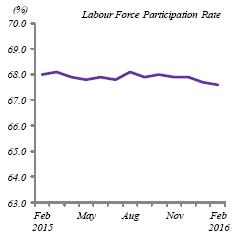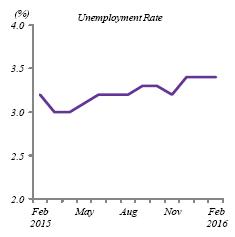Labour Force
- Home
- Statistics
- Labour Market
- Labour Market Information
- Labour Force
Monthly Principal Statistics of Labour Force, Malaysia, February 2016
Monthly Principal Statistics Of Labour Force, Malaysia, January 2016 17 February 2016
Monthly Principal Statistics Of Labour Force, Malaysia, December 2015 22 January 2016
Monthly Principal Statistics Of Labour Force, Malaysia, November 2015 23 December 2015
Monthly Principal Statistics Of Labour Force, Malaysia, October 2015 25 November 2015
EMployment Dec 2014 25 November 2015
Monthly Principal Statistics Of Labour Force, Malaysia, September 2015 Show all release archives
Overview
|
Labour Market in Malaysia, February 2016 |
Series 81 Vol.04/2016 |
| Indicator | Previous Month | Same month of the previous year |
||||
|
February
2016
|
January
2016
|
Change % |
Februaryr
2015
|
Change
(%)
|
||
| Labour force (‘000) | 14,703.3 | 14,652.0 | 0.4 | 14,554.7 | 1.0 | |
| Employed (‘000) | 14,196.9 | 14,150.5 | 0.3 | 14,092.9 | 0.7 | |
| Unemployed (‘000) | 506.4 | 501.5 | 1.0 | 461.8 | 9.7 | |
| Outside labour force (‘000) | 7,063.1 | 6,984.2 | 1.1 | 6,847.8 | 3.1 | |
| Labour force participation rate (LFPR) (%) | 67.6 | 67.7 | -0.1 | 68.0 | -0.4 | |
| Unemployment rate (%) | 3.4 | 3.4 | - | 3.2 | 0.2 | |
| Seasonally adjusted | ||||||
| Unemployment rate (%) | 3.2 | 3.2 | - | - | - | |
r Updated
|
Starting January 2016 Monthly Release, the labour force statistics are estimated based on the latest current population estimates. Therefore the monthly statistics labour force time series is updated. |
 |
Labour force participation rate was 67.6% The labour force participation rate in February 2016 decreased 0.1 percentage points to 67.6 per cent compared to the previous month. Year-on-year comparison showed that the labour force participation rate decreased 0.4 percentage points compared to 68.0 per cent in February 2015.
|
|
|
 |
Unemployment rate was 3.4% The unemployment rate for February 2016 was 3.4 per cent, similar to January 2016. Year-on-year comparison showed that the unemployment rate rose by 0.2 percentage points. Meanwhile the seasonally adjusted unemployment rate was 3.2 per cent, same as was recorded in the previous month.
|
TECHNICAL NOTES
The survey population is defined to cover persons who live in private living quarters and hence excludes persons residing in institutions such as hotels, hostels, hospitals, prisons, boarding houses and construction work site.
The survey comprises of the economically active and inactive population. To measure the economically active population, the LFS uses the age limit of 15 to 64 years. The economically active population comprises of those employed and unemployed whereas those who are inactive is classified as outside the labour force.
LFS uses the actual status approach, where a person is classified on the basis of his labour force activity during the reference week.
- Labour force refers to those who, during the reference week are in the 15 to 64 years (in completed years at last birthday) and who are either employed or unemployed.
- Employed refers to all persons who, at any time during the reference week worked at least one hour for pay, profit or family gain (as an employer, employee, own-account worker or unpaid family worker). Also considered as employed are persons who did not work during the reference week because of illness, injury, bad weather, leave, labour dispute and social or religious reasons but had a job, farm, enterprise or other family enterprise to return to. Also included are those on temporary lay-off with pay who would definitely be called back to work.
- Unemployed
Unemployed refers to those who do not have a job but are interested to work. There are two groups of unemployed that is the actively unemployed and inactively unemployed.
- The economic activity of a population depends on the demographic characteristics of that population. The proportion of economically active population, therefore, differs between sub-groups of that population. These variations are measured by specific activity rates termed as labour force participation rate. Labour force participation rate is defined as the ratio of the labour force to the working age population (15 to 64 years), expressed as percentage.
- Unemployment rate is the proportion of unemployed population to the total population in labour force. This rate measures the percentage of unemployed population in the labour force.
Seasonally adjusted
Population benchmarks
Population by characteristics of age group, ethnicity and state were used as benchmarks to produce labour statistics.
Starting with the monthly release of the Principal Statistics of Labour Force, Malaysia, January 2016, the principal statistics of labour is estimated based on the current population estimates as compared to the previous series which used population projections based on the Population and Housing Census of Malaysia, 2010. This rebase is to obtain statistics that is more consistent with current population structure.
Released By:
THE OFFICE OF CHIEF STATISTICIAN MALAYSIA
DEPARTMENT OF STATISTICS, MALAYSIA
25 April 2016
Contact person:
Ho Mei Kei
Public Relation Officer
Corporate and User Services Division
Department of Statistics, Malaysia
Tel : +603-8885 7942
Fax : +603-8888 9248
Email : mkho@stats.gov.my
Subscribe
Newsletter
Subscribe to our newsletter and stay updated
For interviews, press statement and clarification to the media, contact:
Baharudin Mohamad
Public Relation Officer
Email: baharudin[at]dosm.gov.my
Phone: 03 8885 7942
Not found what you looking for? Request data from us, through
Go to eStatistik
email to data[at]dosm.gov.my
call 03 8885 7128 (data request)









